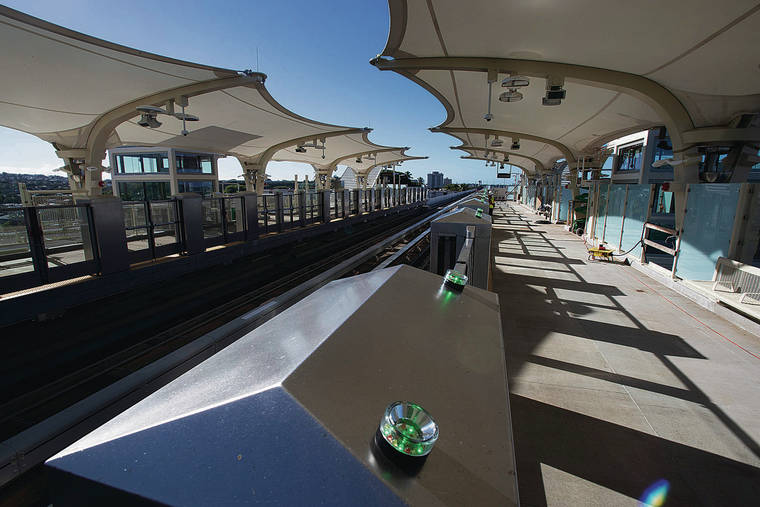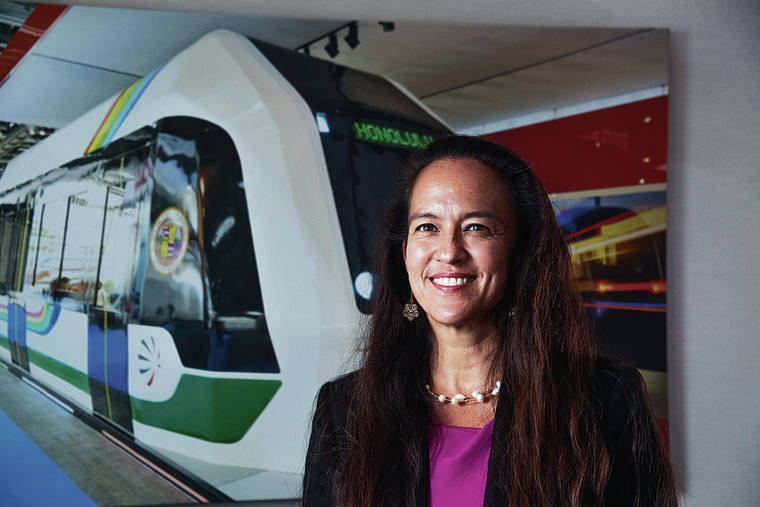Problems piling up for the Honolulu rail project


CINDY ELLEN RUSSELL / 2020
The goal for the Honolulu Authority for Rapid Transportation is to deliver the rail project to Aloha Stadium by the end of the year. Pictured is the passenger deck of the Halawa Station near Aloha Stadium.

STAR-ADVERTISER
Lori Kahikina:
The interim HART CEO said delays to the rail’s opening will be costly because of a contract with operator Hitachi



When the too-narrow wheels on the city’s trains and too-wide track finally fit properly, it’s going to be critical to get trains running to Aloha Stadium as soon as possible or face a whole new series of costs and delays, the head of the rail project told the Honolulu Star-Advertiser’s Spotlight Hawaii livestream show Wednesday.
There is still no decision on whether to replace the wheels with bigger ones, which would make the trains too heavy — or whether to manufacture new track, ship it to Hawaii and then tear up the old track in a process that would take over a year, said Lori Kahikina, interim CEO and executive director of the Honolulu Authority for Rapid Transportation.
“So we’re getting all of the smart people from HART and our consultant and Hitachi in the same room to see what is the most viable solution,” Kahikina said. “It seems to be pointing to the wheels.”
Kahikina did not respond to a question about bigger wheels making the trains overweight.
The wheels are a half-inch too narrow at track intersections called “frogs.” The trains currently navigate through the frogs by slowing down.
But reducing speed creates yet another problem, Kahikina said.
Don't miss out on what's happening!
Stay in touch with breaking news, as it happens, conveniently in your email inbox. It's FREE!
“Before it was discovered, they were running about 55 mph over the frogs and there were some irregularities — wear and tear on the tracks and that’s what brought this to light,” Kahikina said. “So right now they’re addressing it by running slower through the frogs. But that’s not going to work for when we’re in operation for our commuters because there’s an expectation that there’s going to be a train every 4 to 5 minutes at the station. But if they have to slow down every time they come across a frog we’re not going to meet that. So we really do need to fix this.”
Changing the wheels would likely enable HART to deliver the rail project to Aloha Stadium and to the city’s Department of Transportation Services by the end of the year.
“But if it’s the tracks that need to replaced, we don’t think we can hand it over to the city by the end of the year,” Kahikina said. “… To replace the frogs, it takes about a year to manufacture them and then ship them here to us and then, of course, we need to do the construction to tear out what’s been installed and put it in. So at least a year (delay) if it’s the tracks.”
Asked why rail needs to get to Aloha Stadium — which no longer holds events with spectators in the stands — Kahikina said it’s important to start running the system as soon as it’s ready or pay Hitachi $130,000 a day for trains that are not carrying passengers.
Hitachi Rail International has the HART contract to operate and maintain the city’s rail line for its first 13-1/4 years.
“If Hitachi is ready to go and we don’t open up, we’re still going to have to pay them and it’s about $130,000 a day,” Kahikina said. “We cannot have this kind of asset sitting idle.”
Officials at Pearl Harbor also are in talks about running an employee shuttle from the stadium station to Pearl Harbor, Kahikina said.
Kahikina addressed several issues that have raised questions about the future and recent past of the proposed 20-mile, 21-station project that’s currently scheduled to run from East Kapolei to Ala Moana Center, but lacks the money to get there.
Each mile of overhead guideway costs $150 million, Kahikina said. Each station is expected to cost $50 to $75 million and eight remain to be built.
The project is currently budgeted at $12.499 billion with a shortfall of around $3 billion, raising questions on whether to halt rail somewhere shy of Ala Moana.
A variety of approaches are expected to close 20% to 25% of the shortfall, Kahikina said.
HART has asked for another $850 million in federal aid from President Joe Biden’s administration, a request that Kahikina called “a long shot.”
“I doubt we’re going to get it,” she said. “But if you don’t ask, you’re not going to get.”
“I don’t have a good answer where the remaining 75% is going to come from,” Kahikina said. “But we just need to keep looking and finding better ways to do things and close that gap. But I do not expect someone to just write me a $3 billion check and bail us out.”
Among her cost-cutting efforts, Kahikina has dismissed HART employees and ended consulting contracts. She has since been “getting beat up” by awarding a consultant contract to former Congresswoman and HART board chairwoman Colleen Hanabusa. The contract was valued at $924,000 over six years and appeared written specifically for Hanabusa.
“Colleen Hanabusa was the only candidate that put in a proposal,” Kahikina said. “I know I’m getting beat up that I could have stopped it. I didn’t have to do the procurement because I am the procurement authority. The HART board does not have that. It lies with me directly so I did. I could have stopped it — and told the board that, ‘No. I’m not going to do this.’ But I just didn’t think it was prudent. This was something that they felt strongly about that they needed, so I went ahead and did the procurement.”
Mayor Rick Blangiardi intends to appoint Hanabusa to the volunteer HART board on June 30. She will not fulfill the contract, which is not expected to be awarded to anyone else.
Asked whether the cost of the rail project will rise yet again, Kahikina said:
“I hope it’s not higher. I actually hope it’s less … because I don’t want to be out here again saying, ‘Oh sorry. You know what? It really wasn’t 12. It’s 13. Or it’s 14.’ HART has consistently done that and I don’t want to do that.
“People have a right to be angry with HART,” said Kahikina, who wants the permanent job when her interim contract expires at the end of the year. “ … Our reputation over the years — we haven’t been open, honest and transparent. And so I’m trying to change HART’s image being just that — the good, the bad, the ugly. I’m going to say it like it is.”





